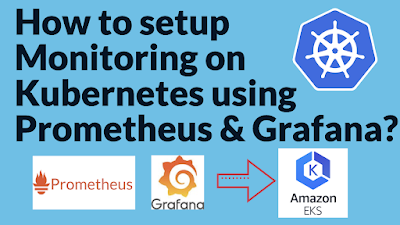What is Prometheus?
- Prometheus is an open source monitoring tool
- Provides out-of-the-box monitoring capabilities for the Kubernetes container orchestration platform. It can monitor servers and databases as well.
- Collects and stores metrics as time-series data, recording information with a timestamp
- It is based on pull and collects metrics from targets by scraping metrics HTTP endpoints.
What is Grafana?
- Grafana is an open source visualization and analytics software.
- It allows you to query, visualize, alert on, and explore your metrics no matter where they are stored.
Why System monitoring is critical?
- Alerting: can give early warning of issues or problems before they become serious, costly or irreversible.
- Visibility: Monitoring provides real-time insights into the health and performance of your applications and infrastructure.
- Capacity Planning: By collecting and analyzing data over time, you can make informed decisions about capacity planning, such as when to add or remove nodes, allocate more resources, or scale your applications.
Prometheus Architecture
Key components:
Installation Method:
The are are many ways you can setup Prometheus and Grafana. You can install in following ways:
1. Create all configuration files of both Prometheus and Grafana and execute them in right order.
2. Prometheus Operator - to simplify and automate the configuration and management of the Prometheus monitoring stack running on a Kubernetes cluster
3. Helm chart (Recommended) - Using helm to install Prometheus Operator including Grafana
Why to use Helm?
Helm is a package manager for Kubernetes. Helm simplifies the installation of all components in one command. Install using Helm is recommended as you will not be missing any configuration steps and very efficient.Pre-requisites:
- EKS Cluster needs to be up and running. Click here to learn how to setup EKS cluster in AWS cloud.
- Install Helm3
- EC2 instance to access EKS cluster
Implementation steps
We need to add the Helm Stable Charts for your local client. Execute the below command:
Install kube-prometheus-stack
Below is helm command to install kube-prometheus-stack. The helm repo kube-stack-prometheus (formerly prometheus-operator) comes with a grafana deployment embedded.
kubectl get pods -n prometheus
kubectl get svc -n prometheus
Edit Prometheus Service
Edit Grafana Service
kubectl get svc -n prometheus
How to Create Kubernetes Monitoring Dashboard?
For creating a dashboard to monitor the cluster:
Click '+' button on left panel and select ‘Import’.
Enter 12740 dashboard id under Grafana.com Dashboard.
Click ‘Load’.
Select ‘Prometheus’ as the endpoint under prometheus data sources drop down.
Click ‘Import’.
This will show monitoring dashboard for all cluster nodes
How to Create Kubernetes Cluster Monitoring Dashboard?
For creating a dashboard to monitor the cluster:
Click '+' button on left panel and select ‘Import’.
Enter 3119 dashboard id under Grafana.com Dashboard.
Click ‘Load’.
Select ‘Prometheus’ as the endpoint under prometheus data sources drop down.
Click ‘Import’.
This will show monitoring dashboard for all cluster nodes
Create POD Monitoring Dashboard
For creating a dashboard to monitor the cluster:
Click '+' button on left panel and select ‘Import’.
Enter 6417 dashboard id under Grafana.com Dashboard.
Click ‘Load’.
Select ‘Prometheus’ as the endpoint under prometheus data sources drop down.
Click ‘Import’.
This will show monitoring dashboard for all cluster nodes.
Cleanup EKS Cluster
eksctl delete cluster --name demo-eks --region us-east-1




















no words sir....goodjob.
ReplyDeleteThanks PJ
DeleteHaha what to say here. I think the best document so far. I am a SQL server DBA and just started learning all this. I don't think other blogs will help me this much...Thank you so much for your time 🙏 will explore who site of yours. Thank you once again for the wonderful document.
ReplyDeleteif i want to un install the prometheus from the cluster, can you please suggest me the process of doing that as well.
ReplyDeletehow to change the port number after the installation of the svc... if the port numbers are overlapping with other service port numbers. how to overcome this issue
ReplyDeletevery very good content
ReplyDeleteWhile installing kube-prometheus-stack chart with helm if I pass --set prometheus.service.type=LoadBalancer --set grafana.service.type=LoadBalancer then will the Grafana and Prometheus service be loadbalancers ? Kindly confirm because I heard somewhere that the chart only supports ingress and does not support loadbalancer.
ReplyDelete